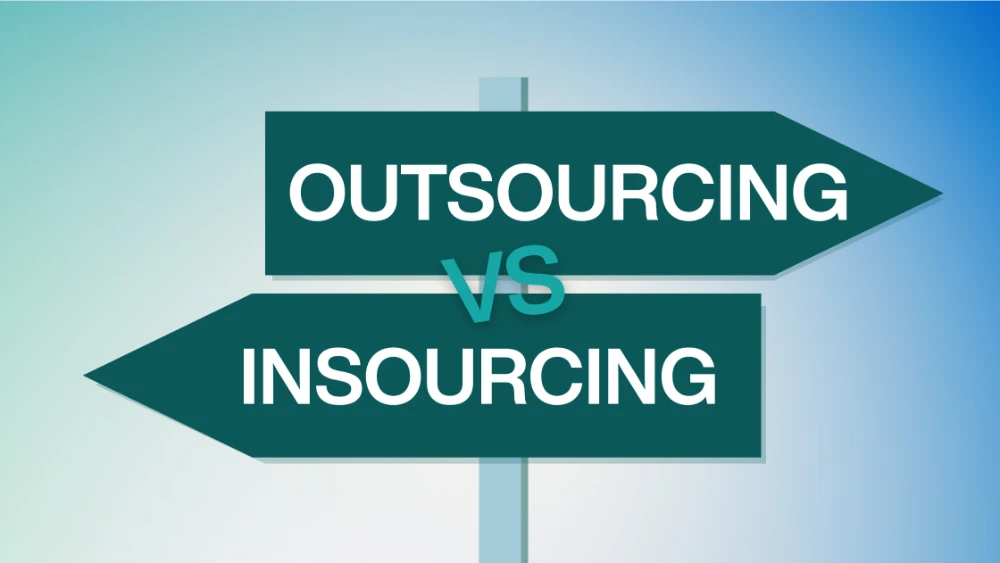Home |
Insourcing vs. Outsourcing: Which One Should You Choose for Your Business?
July 8, 2025


As a business owner or manager, being strategic in resource allocation is crucial. One of the key decisions you’ll face is whether to insource or outsource tasks. Each approach has its unique benefits and potential challenges, which you need to weigh carefully. Before making a decision, it’s important to consider the specific tasks at hand, your available resources, and both your short- and long-term objectives.
In this article, we’ll explore the key differences between insourcing and outsourcing services, highlighting their advantages and disadvantages. This will help you determine which model best suits your business’s needs for achieving and sustaining success.
Insourcing vs. Outsourcing: What’s the Difference
What is Insourcing?


Photo by Campaign Creators on Unsplash
Insourcing involves utilizing your internal employees and teams to carry out specific tasks and projects. This might mean hiring new professionals for vacant positions or reassigning responsibilities to current staff.
By leveraging in-house talent, insourcing allows you to have direct oversight and control over business operations. This enhances alignment with your strategic goals and company values. Additionally, it promotes agile decision-making, maximizes your available resources, and supports smoother collaboration across various business functions or departments.
Common Arguments for Insourcing


Photo by Yan Krukau
While insourcing has its benefits, there are several disadvantages you should consider carefully. Here are the most common drawbacks:
Higher Operational Costs
Insourcing can lead to higher expenses, including salaries, benefits, training, and maintenance costs. Unlike outsourcing, where some of these costs are absorbed by third-party vendors, all financial responsibility falls on you. This can put a strain on your resources, especially if you’re running a smaller business.
Limited Expertise
Your in-house teams might lack the specialized expertise or industry-specific knowledge that third-party vendors offer. This limitation could hinder innovation, slow down progress, and affect the quality of work, particularly when dealing with complex tasks or new operational needs.
Reduced Flexibility
You might find it challenging to scale operations quickly in response to changing market demands. The process of hiring and training new employees can be time-consuming and resource-intensive, which limits your ability to act on growth opportunities swiftly.
Management Burden
Managing internal teams requires a significant investment of time and resources to oversee employee performance, development, and daily operations. While it’s expected that you take care of your teams, this added responsibility can increase pressure on your leadership roles in certain departments.
By weighing these factors, you can make a more informed decision about whether insourcing is the right choice for your business.
What is Outsourcing?


Photo by Nguyen Dang Hoang Nhu on Unsplash
Outsourcing is a practice that you might find beneficial for your business. It involves hiring external partners or companies to take on specific services or job functions, particularly when your team lacks the necessary skills or expertise. By outsourcing, you can concentrate on your core activities while allowing third parties to handle the rest.
You can approach outsourcing in different ways:
- Onshore (within your country), nearshore (to a neighboring country)
- Offshore (to a more distant location) for cost savings.
Some examples you might consider include:
- Business Process Outsourcing (BPO), which involves delegating functions such as marketing or human resources.
- Knowledge Process Outsourcing (KPO) is another option, focusing on more specialized, knowledge-intensive tasks.
- Recruitment Process Outsourcing (RPO) to streamline your hiring process
- Information Technology Outsourcing (ITO) for your IT needs, covering everything from infrastructure support to application development
However, it’s important for you to weigh the potential downsides of outsourcing. For instance, you might experience less flexibility, as contracts and service level agreements (SLAs) can limit your ability to adapt quickly to changes in a project’s scope.
You should also consider whether working with external teams aligns with your company culture. Mismatches in values and communication styles can create challenges in collaboration and effectiveness. Additionally, be aware of quality control issues; if third-party vendors follow different standards or have limited oversight, it may be challenging to maintain consistent quality in deliverables.
If you’re exploring IT partnerships, CloudConsole could offer scalable solutions that are customized to your business needs, making it worth your consideration.
When Outsourcing Might Not Be Ideal


Photo by Yan Krukau
Before you choose to outsource, it’s important to consider potential drawbacks:
Less Flexibility
Outsourcing may limit your ability to quickly pivot or change scope mid-project. Services typically operate within contracts and SLAs, which can delay your responsiveness when internal changes are needed urgently.
Concerns About Company Culture Fit
Working with external teams may raise concerns about alignment with your company’s values, internal processes, and communication styles. A mismatch in culture can impact collaboration and overall effectiveness.
Quality Control Issues
When third-party vendors follow different standards or have limited oversight, maintaining consistent quality becomes more challenging. This can result in deliverables that fall short of your expectations.
Why Do Businesses Choose to Outsource?


Outsourcing enables you to access external expertise, advanced technologies, and greater operational flexibility. Here are several key advantages for you to consider:
Access to a Wider Talent Pool
Outsourcing allows you to tap into a global network of professionals with specialized expertise not yet available internally. This opens up access to top-tier talent without being limited by geography.
Reduced Labor Costs
Maintaining in-house teams, especially full-time employees, can incur significant costs. Outsourcing offers savings by working with professionals in regions with lower costs of living or hiring freelancers to optimize your budget use.
Improved Focus on Core Growth Areas
By outsourcing non-core or time-intensive tasks, you can reallocate internal resources to strategic initiatives that drive innovation and growth. This improves your overall operational efficiency and productivity.
Competitive Advantage
Accessing specialized skills from outside your organization often comes at a lower cost and with faster turnaround times. This provides you with a competitive edge, allowing quicker project delivery and the flexibility to scale based on market demands.
Which One Should You Go For?
When choosing between insourcing and outsourcing, the right decision depends on your business’s priorities.
If you value direct control, frequent communication, and strong cultural alignment, insourcing may be the more suitable option for you. This approach works well for managing sensitive data, core operations, or when your internal team already has the needed skill set.
However, remember that insourcing comes with higher costs and requires a long-term investment in training and retaining staff. While more resource-intensive, building strong internal teams can offer you long-term value and stability.
On the other hand, outsourcing is ideal when you aim to:
– Reduce operating costs
– Access expertise that is not available internally
– Scale quickly for short-term project demands
Outsourcing works well for non-core functions like IT support, customer service, or payroll. But to ensure consistent delivery, maintaining strong vendor relationships and quality control is essential.
If you’re ready to outsource with confidence, CloudConsole is the trusted IT partner you need. From network optimization to outsourced IT staffing, we deliver scalable, hands-on solutions that keep your business ahead, especially in an environment where technical setbacks can slow you down. We equip your business with the tools, expertise, and 24/7 support needed to ensure continuity with minimal downtime. If you’re looking for accessible expert support, then kickstart your transformation with us!
